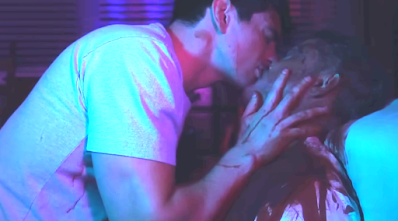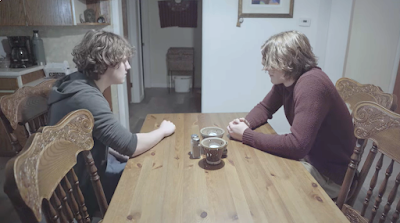trading up
by Douglas Messerli
Peter Stone (screenplay, based on a
story by Stone and Marc Behm), Stanley Donen (director) Charade / 1963
Stanley Donen’s comedic thriller, Charade, begins with a wealthy young
woman, Regina Lambert (Audrey Hepburn), ensconced at a ski resort (Megève)
where she admits to her friend, Sylvie, that she is soon going to get a divorce
from her husband Charles: there are too many things she does not know about her
husband, too many secrets that he has seemingly kept from her. A few moments
later a handsome stranger, Peter Joshua (Cary Grant), complains to her about
her friend, Sylvie’s water-gun shooting son. The stranger is rebuffed with a
clever put-down:
Reggie: I already
know an awful lot of people and until one
of them dies I
couldn’t possibility meet anyone else.
Peter: Well, if
anyone goes on the critical list, let me know.
When he turns to go, she chides him,
“You give up awfully easily.”
The scene sets up the movie in a nutshell: love, divorce, guns—or
violence, at least—will be our focus for the next 100 and some minutes, along
with, of course, some tuneful songs by Henry Mancini. And the hero, with whom
Regina quickly falls in love, will never properly pursue her, at least
romantically. He will give up time and time again, excusing himself simply by
changing his identity, insisting that he has only a mother, while refusing to
become a true lover. The device is perfect for Grant, who, as a now cinematic
gay icon, can accordingly pretend to make constant love to Hepburn’s character
while offering her a figure who will just as quickly disappear from her life,
only to be replaced by another charming and handsome version of himself.
Upon her return to Paris, Reggie
discovers her entire apartment has been cleaned out, her maid is missing, and,
before long, she receives news of her husband’s death, a man murdered and
tossed from a train. She can now “meet” that new someone, and on cue Peter
Joshua again shows up—a clumsy and basically unexplained plot element that
nonetheless seems to make sense, for we already know that they are, by the
rules of the plot, destined to fall in love.
But the reality of the tale is that
Reggie has no choice now but to head to the streets, where she spends most of
the film, or, at the best, to check into a cheap Paris hotel with Joshua, quite
inexplicably, as her “next door neighbor.”
Charade’s ludicrously
labyrinthine plot suddenly takes over as we are introduced, one by one—at
Charles’ funeral, no less—to the minor characters, Tex Panthollow (James
Coburn), Herman Scobie (George Kennedy), and Leopold Gideon (Ned Glass), a
group of ex-soldiers who, along with Charles and another missing and mysterious
figure, Carson Dyle, together robbed an OSS shipment of $250,000 in gold that
was to have been delivered to the French Resistance, and the US government—so
Reggie is told by embassy officer, Hamilton Bartholomew—who wants it back. He,
as a government authority, as well as the three surviving robbers, are
convinced that, since Charles held the money, she must know of its whereabouts.
Once this ridiculous plot contrivance is set up, the movie settles back
into a false romantic comedy as Reggie and Joshua rush about Paris, threatened
and harassed, from time to time, by the evil “gang.”
Grant, so the story goes, was hesitant about being involved in a film
where he (at the 59 years of age) was chasing Hepburn (34); so the writers
simply cut all of his lines that suggested his sexual interest in her, and gave
them to the character Reggie, the result of which is that Grant plays his
character with the most laid-back diffidence of his film career. He seems more
bemused by Reggie than sexually interested. In truth, this is the role that
Grant played in most of his films.

As the threats and acts of violence—a burning-match attack in a
telephone booth, the kidnapping of Sylvie’s son, a battle between Joshua and
Scobie on the roof of the hotel—begin to pile up, it also becomes evident that
Joshua is not whom he seems, finally admitting that he is Carson Dyle’s
brother, Alexander. At first horrified at his lies—it is lies, we must
remember, that separated her from her husband—Reggie quickly recovers her
equilibrium and, even more incredulously, her trust in Grant’s character, the
authors repeating the same conversation that she had with Peter Joshua, as a
standing joke:
Reggie: Is there a
Mrs. Dyle?
Alexander Dyle:
Yes…
[Reggie’s face drops]
Alexander Dyle: but,
we’re divorced!
Reggie [smirking] I thought that was Peter
Joshua?
Alexander Dyle: I am
just as difficult to live with
as he was.
Despite the fact that she was ready to divorce her now-dead husband
because he was not honest with her, off she now goes with the interloper for
more adventures, these ending in several deaths, as the robbers begin to
suspect each other. Once more, Reggie and, now Alexander, go through the
contents of a small bag Charles Lambert had left behind: toothpaste, a small
calendar, a letter, a ticket to Venezuela, and passports in multiple names
etc., nothing that seems of value.
But now, following the instructions of the embassy official Bartholomew,
Reggie finds herself in an even more terrifying situation, particularly when he
insists that Dyle’s brother died years ago. Soon after the camera pulls back to
find the Grant figure in the room with the remaining “gang” members.
The former Peter Joshua, Alexander Dyle now admits he is simply a
professional thief, Adam Canfield. The series of questions is repeated once
again, her trust in the man amazingly intact.
As the body count rises, both Reggie and now Adam, follow a clue in her
husband’s calendar where they encounter several booths selling stamps to
collectors. In a simultaneous instant both she—who has given the letters on the
envelope to Sylvie’s young son—and he realize the truth: the money has been
used to purchase several rare stamps, which the boy, Jean-Louis, has exchanged
with a stamp dealer for a large package of international stamps. When they
track down the dealer, he admits the rarity of the stamps, returning them to
Reggie.
But now that they have the “money,”
Reggie is in even more danger as Bartholomew, the embassy man, lures her to a
square outside the Paris Opera, with Joshua/Dyle/Canfield chasing after.
Bartholomew, we discover, is really Carson Dyle, one of the original soldiers
who have stolen the gold, and is now about to kill Reggie. Hiding in the
prompter’s box Reggie is stalked by Dyle as Canfield, high above, tracks
his steps across the stage, finally springing open a stage trap door which
sends Dyle to his death. I told you the plot was ludicrous and labyrinthine,
now becoming quite operatic.
No matter, Reggie is safe, has the money in hand, and has fallen in love
with Canfield. Crime seems to have paid off, even if the stamps, now glued to
the envelope, may not have the same net value. Oddly, despite being a
professional thief, Canfield, encourages her turn over the stamps to the US
embassy.
As Reggie enters the office of the US agent, Brian Cruikshank, the
government official in charge of recovering stolen property, she is suddenly
greeted—you guessed it—with Cary Grant, who now admits, just maybe, his real
name:
Reggie: Is there a
Mrs. Cruikshank?
Cruikshank: Yes.
Reggie: But you’re
divorced.
Cruikshank: No.
[Regina’s face drops]
Cruikshank: [getting out his wallet to show her a picture]
My mother, she
lives in Detroit, you’d like her, she’d
like you too.
Reggie: Oh, I love
you, Adam, Alex, Peter, Brian, what-
ever your name is, I
love you! I hope we have a lot of boys
and we can name them
all after you!
So, it appears, she has traded in the stamps—which presumably had
formerly been the contents of her house—for a new husband. And so many people
have died or simply been extinguished in this story, that she will now clearly
have room to meet many another in her future life.
Yet there is absolutely no evidence that “Adam/Alex/Peter/Brian” or any
other version of Grant’s personae will hug her close to his chest and take her
home as a husband. We need only recall that when he showered in her room in an
earlier scene, it was with his suit on.
Los Angeles, November 10, 2011
Reprinted from World Cinema Review (November 2011).














